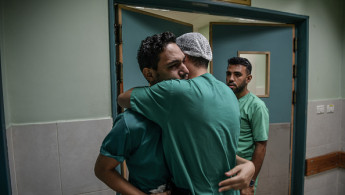Israel orders displaced Palestinians out of Kuwait Hospital in Gaza's Rafah
Israel has ordered more evacuations in the Gaza Strip’s southern city of Rafah on Monday after displaced Palestinians were asked to leave the Kuwait Hospital.
For months, Israel has threatened to storm Rafah, which borders Egypt and is sheltering around one million displaced Palestinians. World leaders, the UN and humanitarian organisations have warned an attack on the city would be catastrophic. There have already been dozens of airstrikes and casualties.
It was not clear if Israeli forces planned on attacking the Kuwait Specialised Hospital as it had done with other hospitals across the besieged territory. Israel accuses Hamas of using these hospitals as command centres, allegations which the Palestinian movement, NGOs and medical staff at the hospitals have refuted.
Three of Gaza's main hospitals are based in the southern governorate, including Abu Yousef al-Najjar, Al-Helal Al-Emirati Maternity Hospital and Kuwait Hospital, all of which are now at grave risk of collapsing.
Four out of seven working field hospitals are also located in the Rafah area.
Israeli forces have surrounded, stormed, laid siege and bombarded hospitals during its seven-month war on the Gaza Strip. Al-Shifa Hospital - Gaza’s largest - and Nasser Hospital now lay in ruins, with hundreds of bodies found in mass graves there.
500 health workers killed
Meanwhile, the territory’s health ministry announced on Sunday that at least 500 medical personnel, including 138 nurses, have been killed in Israel’s offensive on the Gaza Strip since 7 October last year.
"Here in Palestine, and in Gaza in particular, we commemorate this day as the Israeli occupation has killed 138 male and female nurses," said ministry spokesman Khalil Al-Dakran during a press conference, marking International Nurses Day.
He said the occasion "this year is exceptional, and we have the right to call this year the Year of Nursing".
Dakran spoke on the sidelines of a vigil carried out at Al-Aqsa Martyrs Hospital in Deir al-Balah in the central Gaza Strip. It is one of dozens of health facilities attacked by Israel during its more than seven-month war on the enclave.
Al-Aqsa was the only hospital in Gaza’s Deir al-Balah district that contained integrated treatment departments, which operated round the clock. It was established by the Palestinian health ministry in 2001, within an emergency plan to treat casualties during the Al-Aqsa Intifada, also known as the Second Intifada or uprising.
Dakran said that 312 other medical workers had been detained by Israel and a further 1,500 wounded, adding huge strain to healthcare services in Gaza.
He praised medical workers in Gaza for operating under such exceptional circumstances, noting that 33 hospitals, 53 health centres, and 133 ambulances in the Gaza enclave have been destroyed by Israel, while the war has also led to a severe shortage in medicine and other essential supplies.
Dakran called on the international community to pressure Israel to stop its attacks on health facilities in Gaza and urged patients to be sent abroad for treatment due to chronic challenges faced by medical workers in the enclave due to the war and siege by Israel.
Fasting on the frontlines: Gaza's health workers persevere this #Ramadan despite hunger and lack of supplies ⤵ https://t.co/1VwvyZ8JJx
— The New Arab (@The_NewArab) April 6, 2024
Israel has continuously hampered the delivery of desperately needed aid and has closed and reopened border crossings into Gaza.
Since then, Israel’s air and ground offensive has killed more than 35,000 people, mostly women and children according to the territory’s health ministry. Thousands more are presumed dead beneath the rubble.
As well as the risk of famine, the destruction of Gaza’s main hospitals and critical infrastructure such as water networks could cause the spread of diseases, especially in crowded places such as the city of Rafah.





 Follow the Middle East's top stories in English at The New Arab on Google News
Follow the Middle East's top stories in English at The New Arab on Google News


